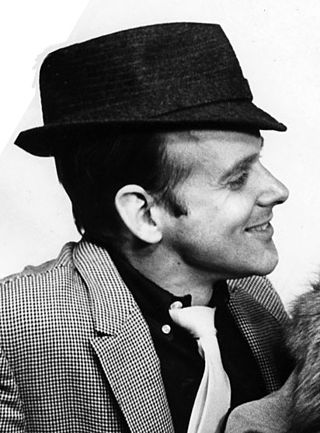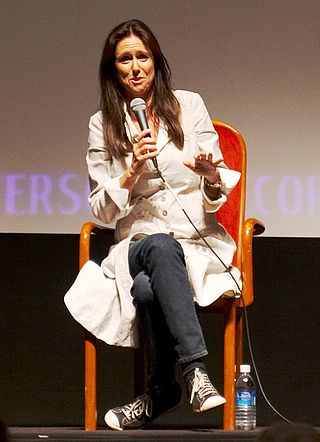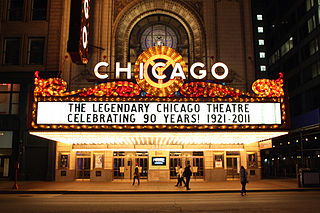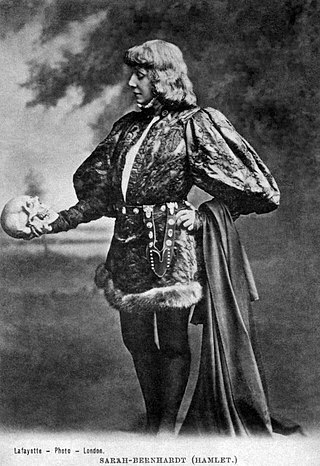
The performing arts are arts such as music, dance, and drama which are performed for an audience. They are different from the visual arts, which are the use of paint, canvas or various materials to create physical or static art objects. Performing arts include a range of disciplines which are performed in front of a live audience, including theatre, music, and dance.

The following outline is provided as an overview of and topical guide to theatre:

Robert Louis Fosse was an American actor, choreographer, dancer, and film and stage director. He directed and choreographed musical works on stage and screen, including the stage musicals The Pajama Game (1954), Damn Yankees (1955), How to Succeed in Business Without Really Trying (1961), Sweet Charity (1966), Pippin (1972), and Chicago (1975). He directed the films Sweet Charity (1969), Cabaret (1972), Lenny (1975), All That Jazz (1979), and Star 80 (1983).

Puppetry is a form of theatre or performance that involves the manipulation of puppets – inanimate objects, often resembling some type of human or animal figure, that are animated or manipulated by a human called a puppeteer. Such a performance is also known as a puppet production. The script for a puppet production is called a puppet play. Puppeteers use movements from hands and arms to control devices such as rods or strings to move the body, head, limbs, and in some cases the mouth and eyes of the puppet. The puppeteer sometimes speaks in the voice of the character of the puppet, while at other times they perform to a recorded soundtrack.

Julie Taymor is an American director and writer of theater, opera, and film. Her stage adaptation of The Lion King debuted in 1997 and received eleven Tony Award nominations, with Taymor receiving Tony Awards for her direction and costume design. Her film Frida, about Mexican artist Frida Kahlo, was nominated for five Academy Awards, including a Best Original Song nomination for Taymor's composition "Burn It Blue". She also directed the jukebox movie musical Across the Universe, based on the music of The Beatles.

Lyric Opera of Chicago is one of the leading opera companies in the United States. It was founded in Chicago in 1954, under the name 'Lyric Theatre of Chicago' by Carol Fox, Nicola Rescigno and Lawrence Kelly, with a season that included Maria Callas's American debut in Norma. The company was re-organized by Fox in 1956 under its present name and, after her 1981 departure, it has continued to be of one of the major opera companies in the United States. The Lyric is housed in a theater and related spaces in the Civic Opera Building. These spaces are now owned by the Lyric.

Scenic design is the creation of theatrical, as well as film or television scenery. Scenic designers come from a variety of artistic backgrounds, but in recent years, are mostly trained professionals, holding B.F.A. or M.F.A. degrees in theatre arts. Scenic designers create sets and scenery that aim to support the overall artistic goals of the production. There has been some consideration that scenic design is also production design; however, it is generally considered to be a part of the visual production of a film or television.
Staging is the process of selecting, designing, adapting to, or modifying the performance space for a play or film. This includes the use or absence of stagecraft elements as well as the structure of the stage and its components.

Theater in Chicago describes not only theater performed in Chicago, Illinois, but also to the movement in Chicago that saw a number of small, meagerly funded companies grow to institutions of national and international significance. Chicago had long been a popular destination for touring productions, as well as original productions that transfer to Broadway and other cities. According to Variety editor Gordon Cox, beside New York City, Chicago has one of the most lively theater scenes in the United States. As many as 100 shows could be seen any given night from 200 companies as of 2018, some with national reputations and many in creative "storefront" theaters, demonstrating a vibrant theater scene "from the ground up". According to American Theatre magazine, Chicago's theater is "justly legendary".

Toy theater, also called paper theater and model theater, is a form of miniature theater dating back to the early 19th century in Europe. Toy theaters were often printed on paperboard sheets and sold as kits at the concession stand of an opera house, playhouse, or vaudeville theater. Toy theatres were assembled at home and performed for family members and guests, sometimes with live musical accompaniment. Toy theatre saw a drastic decline in popularity with a shift towards realism on the European stage in the late 19th century, and again with the arrival of television after World War II. Toy theatre has seen a resurgence in recent years among many puppeteers, authors and filmmakers and there are numerous international toy theatre festivals throughout the Americas and Europe.
Performing arts – are art forms where the participant engages in a physical performance using their body, voice, language, or use of specific equipment for entertainment purposes.
Michael Curry is an American production designer who lives in Portland, Oregon. He is also the owner and President of Michael Curry Design Inc. in Scappoose, Oregon, which was started in 1986.
Thalias Kompagnons is the name of a German puppet theatre in Nuremberg, managed by the puppeteers and directors Joachim Torbahn and Tristan Vogt. Their repertoire consists of shows for both adults and children.

Theatre or theater is a collaborative form of performing art that uses live performers, usually actors or actresses, to present the experience of a real or imagined event before a live audience in a specific place, often a stage. The performers may communicate this experience to the audience through combinations of gesture, speech, song, music, and dance. Elements of art, such as painted scenery and stagecraft such as lighting are used to enhance the physicality, presence and immediacy of the experience. The specific place of the performance is also named by the word "theatre" as derived from the Ancient Greek θέατρον, itself from θεάομαι.
Giants Are Small is an entertainment company based in Brooklyn, New York. Founded in 2007 by visual artist/director Doug Fitch, producer/filmmaker Edouard Getaz and multimedia entrepreneur Frederic Gumy, the company produces live and digital entertainment ranging from opera and ballet to family entertainment.
Hamletmachine is a postmodernist drama by German playwright and theatre director Heiner Müller. Written in 1977, the play is loosely based on Hamlet by William Shakespeare. The play originated in relation to a translation of Shakespeare's Hamlet that Müller undertook. Some critics claim the play problematizes the role of intellectuals during the East German Communism era; others argue that the play should be understood in relation to wider post-modern concepts. Characteristic of the play is that it is not centred on a conventional plot, but partially connects through sequences of monologues, where the protagonist leaves his role and reflects on being an actor.
Robert O'Hearn was an American set designer. Though known for his productions of theatre and ballet, he was particularly associated with opera. He designed productions for the Metropolitan Opera from 1960 through 1985.
G. W. "Skip" Mercier was an American costume, puppet, and set designer. He has designed for over 370 productions of theater, musical theater, opera, dance, film, and television. He is best known for his set and costume designs for Juan Darien: A Carnival Mass in which he received a Tony Award Nomination for Scenery and two Drama Desk Nominations for Scenic Design and Costume Design in 1997. He was a member of the faculty at the University of Washington School of Drama, where he taught scenic design and costume design to both graduate students and undergraduates.
Yuval Sharon is an American opera and theater director from Naperville, Illinois, based in Los Angeles. In 2017, he won the MacArthur Genius Grant.











